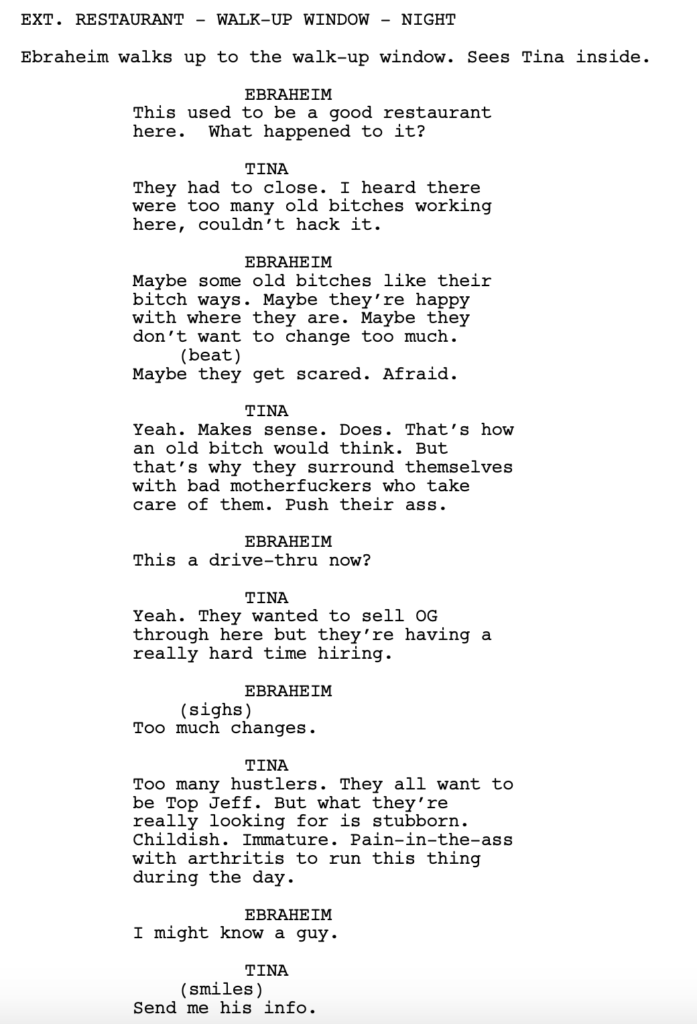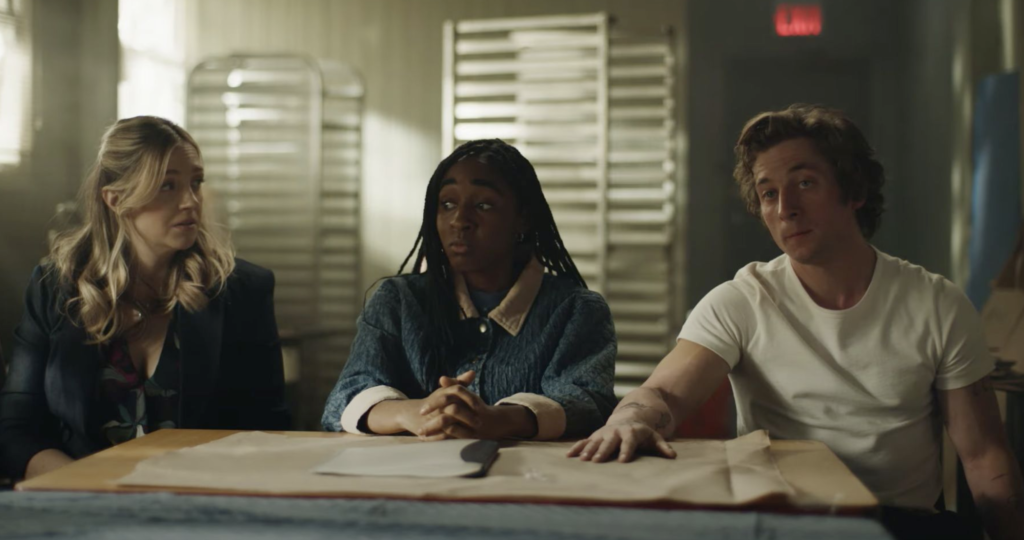I love The Bear. It’s an extremely well-written show. So I thought, let’s bring “10 Screenwriting Tips” out of retirement so we can learn what screenwriting tricks The Bear is using to be so goooooood!
1) Obstacle Mania – Whatever your characters’ giant goal is, your job, especially in a TV show, is to place as many obstacles in front of that goal as you can. The Bear, Season 2, does this better than any show I’ve seen in recent memory. The goal is to open a new fancy restaurant. We’ve got IRS issues. Fire regulations. Finding an investor. Open in just three months. Mold. Walls falling down. Hiring competent staff. The list is never-ending. Obstacles create UNCERTAINTY IN THE NARRATIVE. Which is what you want. You want the reader to be unsure if the characters can do it.
2) Put your characters where they least want to be – Where you find the most drama in a story is when you place characters in places they do not want to be. Richie, the screw-up of the family, hates order and responsibility more than anyone in the world. This guy only thrives in chaos and disorder. In season 2, episode 7, Carmy gets Richie a job in the kitchen of the best restaurant in Chicago. Needless to say, the restaurant thrives specifically on order and responsibility. You can see Richie boiling over just standing in this place. It is the antithesis of him. Which is exactly why we can’t look away. This episode, “Forks,” is my favorite episode of Season 2 because of this lesson.
3) Intense conversations work better when at least one of the people in the conversation doesn’t want to be there – Intense dramatic conversations about life don’t usually play well. They often feel self-indulgent and fake cause kumbaya “I’m all up in my feelings” moments don’t happen all that often in real life. So a way to make them more palatable is to have at least one of the characters in the conversation not want to be there. In season 2, episode 1, an “up in his feelings” Richie is downstairs in the basement feeling bad for himself. Carmy comes down to grab something and Richie blurts out, “You ever think about purpose?” Carmy looks at him and says, “I love you but I don’t have time for this.” But then he sees Richie is really in the doldrums and decides to stay, reluctantly. Richie then makes his big, “I don’t feel any purpose” plea, and Carmy’s not really into it. He has a million things to do. But he stays and listens to the best of his ability. Carmy’s half-interest is what makes this scene work. Cause if they’re both really into this conversation, it’ll feel false.
4) Compounding outside pressure – One of the things The Bear does really well is it places pressure on its characters. But that’s par for the course. Every character should have pressure on them. What The Bear does, though, is it compounds that pressure. It adds ADDITIONAL PROBLEMS to the characters’ lives, which makes every scene feel even heavier, even more important. In “Forks,” midway through the episode, Richie calls his ex-wife, who he’s secretly hoping to get back together with, to manage a situation with their daughter. And the ex-wife tells him that she just accepted a guy’s proposal. This is what compounding pressure looks like. You never let your character off the hook. And the great thing about compounding pressure is that now, whenever Richie encounters an issue in the restaurant, we’re more afraid he’s going to crack. Cause we know that there’s additional things going on in his life.

5) The Scene Agitator – I would be surprised if creator Christopher Storer has not read Scriptshadow Secrets because this man LOVES the scene agitator. As a reminder, the scene agitator is any element you can add to a scene that agitates the characters in some way. Storer rarely lets two characters just talk to each other. He almost always has a third variable in play. For example, in season 2, episode 7, when Richie calls his cousin, Carmy, back at the restaurant, to ask him some questions, the team’s fix-it guy, Neil, is trying to fix a faulty outlet wire, which keeps electrocuting him. So Carmy is trying to talk to Richie while occasionally stopping the conversation to yell at Neil. “Neil! What are you doing! Get away from that thing.” Neil is the agitator here, and provides a more unpredictable conversation between Carmy and Richie.
6) Pronouns and Role Play – This is a preview tip from my dialogue book. A great way to spice up dialogue is to have the characters in the scene playfully use the wrong pronouns as well as use role play, pretending they’re not the people they really are. It allows for a unique conversation that always feels more creative than the on-the-nose version most writers write. In season 2, episode 8, Ebraheim, an old-timer chef at the former restaurant who bailed when Carmy decided to upgrade the restaurant, comes back a couple of weeks before the new restaurant is opening. He runs into his old buddy, Tina, who still works there.

7) Nobody’s angry just because they’re angry. They’re angry because they’re scared – I read a lot of scripts where characters are angry because the writer wants an angry character. But they don’t think about WHY that character is angry. And WHY they’re angry is the whole ball of wax. Because most of the time, they’re angry because they’re scared. Cause they don’t think they can hack it. Like Richie. Richie is my favorite character in this show because of that inner conflict. He’s the loudest. He’s the harshest. He screams at people all the time. When he messes up, it’s always somebody else’s fault. And it’s all because he’s terrified. He’s terrified he’s going to be exposed for the scared little kid he actually is. So when a character is angry, give them a reason for being angry. I promise you, the character is going to come off as so much more genuine if you do.
8) Money makes the TV show go round – Money money money monaaaaay. MONNNAAAY. Money is a wonderful friend in any dramatically told story, but especially in television. The thing with TV is that it doesn’t have that ticking time bomb urgency that a movie can have since a movie is only 2 hours. With TV, the timespan is always longer and so we lose out on that urgency. You can compensate for this by adding a money issue. Your main character(s) should be under some sort of monetary deadline. With The Bear, in order to get the investment for the restaurant, Carmy has to agree that if his uncle isn’t paid back in full within 18 months, the uncle gets the building. Never having enough money is such a universal experience that we always relate to money problems in stories.
9) Make sure to balance the sour with the sweet – The Bear puts its characters through the wringer. It really whacks them up against the head with a lot of crap. If all you do, though, is hurt your characters, your reader will grow frustrated. We’re not sadists. We need good amongst your bad. And The Bear is good at this. It makes sure to intersperse the bad with a nice little occasional scene that gives you the warm and fuzzies inside. In the first episode of season 2, there’s a scene near the end of a tough episode where Sydney, the smart-as-a-whip prodigy sous-chef, runs after Tina, the old school “been here forever” cook who’s accepted her lackluster lot in life. Sydney asks Tina if she would be her assistant. And we just see Tina’s eyes light up when she realizes what Sydney is asking. It’s such a sweet moment as well as a NEEDED ONE. Because we need the sweet within the sour.
10) Scenes With a Lot of Characters In Them – The Bear has a ton of scenes with a lot of characters in them. For these scenes to work, you need to know who your CONTROLLING CHARACTER in the scene is. Your controlling character is the character who wants the most out of the scene. They have the big objective that’s driving the core of the conversation. So in Season 2, Episode 5, five minutes in, Uncle Jimmy (the investor) shows up to the restaurant to check on things. He walks into a room with, literally, seven other characters and everyone in the scene talks at some point. But the scene keeps coming back to Uncle Jimmy because he’s the controlling character. He is the one who wants the most out of this scene. He wants to know that they’re going to be ready to freaking open when they said they’re going to be ready. So that’s what drives most of the conversation, is his questions and directives regarding that topic.
100 dollars off a Screenplay Consultation (feature or pilot) if you e-mail me with the subject line, “THE BEAR!” carsonreeves1@gmail.com. What are you waiting for??



